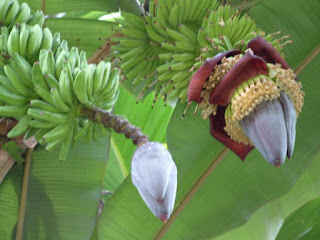Banana protein - Weapon against viruses
(Source: Wiki)
Bananas are one of those foods — they're a good source of all kinds of vitamins and minerals, they can help fight depression, ward off muscle cramps, lower blood pressure and protect against heart attack.
Now, bananas could provide a new weapon against viruses.
According to a recently published study, a protein found in bananas known as lectin — or, colloqially, as BanLec — is being turned into a drug that may someday be used to fight viral infections.
Shown to disarm a number of aggressive viruses, the protein attaches to sugar molecules and keeps viruses out of cells, preventING infection.
But when scientists isolated the protein for therapeutic trials, BanLec also caused irritation and inflammation, so an international team studied the protein and identified the part that caused those side effects.
With some genetic tinkering, they developed a version of BanLec, which retained the retained the proteins anti-viral properties but without the immune response.
With some genetic tinkering, they developed a version of BanLec, which retained the retained the proteins anti-viral properties but without the immune response.
Writing in the journal Cell, the team says it could be one of the first broad-spectrum antiviral agents to treat a variety of viruses, including HIV, hepatitis and even the common avian influenza bug.
Co-senior author David Markovitz, at the University of Michigan in Ann Arbor, warns that you can't get the benefits of banLec by eating a bunch of bananas.
“Remember, when you are eating the banana, then the protein which, by the way, is not our modified protein, but the natural protein – it’s probably going to be chewed up by the stomach acid. So we very much doubt that eating bananas will help you," said Markovitz.
Markovtiz says the new and improved version of BanLec must be injected.
Originally, Markovitz says, the banana protein was being investigated as a microbicide, an agent that women can use before sexual intercourse as a cream or gel to protect them against HIV infection.
But it was shown to disarm a number of viruses, which then simply wither away if they can’t infect cells.
At this point, Markovitz says there are no plans to conduct human clinical trials.
“We’re trying to help people with their health, not harm them. And so it’s good to be cautious about where we are going. You know, we’re also very ambitious to make things work well and bring these to clinical fruition, but we’re not there. We’re early on still," he said.
The sugar molecule that BanLec harnesses offers a unique strategy for fighting viruses, one that scientists say could be used to develop other antiviral drugs.

Keine Kommentare:
Kommentar veröffentlichen